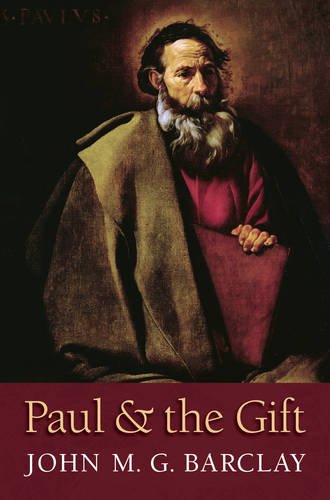BEN: 4 Ezra is one of the most interesting of all early Jewish texts, not least because of its obvious parallels with some NT material in both the Jesus tradition and in Revelation. My first question is— Do you think it possible, or even likely, that the author knew some of the early Jewish Christian material, and is reacting to or co-opting some of it, or would you just attribute the similarities to a shared stream of tradition?
JOHN: I don’t think there is any clear reference to Christian views in the original Jewish text of this work (of course, Christians then interpolated it with Christian additions), so I tend to the ‘parallel tracks’ reading: lots of similar questions, some shared traditions, and answers that partly agree and partly strongly disagree. I think it was written around 100 CE but has roots in Jewish questions about God, the world and history that go back before then.
BEN: One of your more telling comments in this chapter is that too often modern commentators have taken sides with Ezra in the dialogue with Uriel, because Ezra seems to want to emphasize more the mercy and compassion of God, sometimes at the expense of God’s justice. I suppose this is another lesson in how even scholars are not disinterested or purely objective readers of texts. Yet the very fact that such a tendency can be recognized and critiqued shows that a measure of objectivity is possible. Would you agree?
JOHN: Yes, I think we need each other to challenge our readings of texts (that is one of the main purposes of scholarly criticism). Sometimes, more than one reading of a text is equally possible and equally convincing, but often we ‘push’ a text in a preferred direction, or find that it ‘must imply’ something it does not actually say; and we need others to call us to justify our readings. Scholarly ‘objectivity’ is a bit of a myth, because no-one reads from nowhere, but it is striking how good we are at finding the mote in another’s eye and not recognizing the log in our own. A challenge can return us all to look at the text again, and in that sense can pull us back from wishful thinking, but every challenge has its own hidden or overt interests. Rather than talking about more or less ‘objective’ readings of a text, I prefer to speak of more or less ‘responsible’ readings, and the first and most basic responsibility is to read very carefully and very fully what the text actually says.
BEN: Surprisingly, sometimes scholars have said that early Jews didn’t have a theology of the Fall resulting from Adam’s sin, but of course this is not entirely true. Would you say that 4 Ezra has just as much emphasis on this theme as Paul? But at the same time Paul never said ‘each man is his own Adam’ or words to that effect. You’ve spent a lot of time in early Jewish literature, would you say that a theology of human fallenness as found in 4 Ezra and Paul is typical or a-typical in this body of literature (from the 2nd century B.C. to the 2nd century A.D.?
JOHN: 4 Ezra, like Paul, traces the origin of universal human death to the sin of Adam (4 Ezra 3.7), though it does not personify Sin in quite the way that Paul does, in connection with Adam, in Romans 5. Where there is what we might call a ‘Fall’ narrative in Jewish texts of this era, it is sometimes based on Genesis 3 and sometimes on Genesis 6 (the fallen angels who corrupt humankind). And where Jewish texts do focus on Adam and Eve in Geneisis 3, they put different kinds of weight on this text. For some this is just the inevitable result of the mixed and corruptible nature of humanity as created, for others this is a catalysmic fall from earlier perfection. For some, this story recounts a specific episode that alters subsequent history, for others it is paradigmatic of the way we all sin, in our own way and in our own time (‘each of us is the Adam of his own soul’). One can understand why people were reluctant to think that we are somehow ‘fated’ to sin post-Adam, as that might take away from our human responsibility. One can see this question is very much alive in 4 Ezra and its sister-text, 2 Baruch, for instance.
BEN: A strong emphasis seems to be placed in 4 Ezra on the difference between this age and the age to come, when it comes to God’s judgment and mercy. And part of the scenario, as in Revelation, involves a millennium of sorts on the earth. What sort of urgencies do you think drove this particular writer to express his eschatology this way? What is the engine driving this train of thought?
JOHN: In the case of 4 Ezra, the fall of Jerusalem in 70 CE clearly stands in the background, and that has dashed hopes for a resolution of Israel’s history in the current conditions of the world. There needs to be a Messianic warrior, with divine intervention to create a rebalancing of political and spiritual power, but ultimately there needs to be a new age, as this current world is too old, too fragile, and too corrupt to be able to sustain God’s Kingdom. The different kinds of future (in this world and in the next) are not easy to disentangle, but there is a clear divinding line at the last judgment, since at that point sin is finally and fully dealt with, and a new and perfect era can begin. So I think what drives this is pessimism about the present world, and that probably reflects the dashing of hopes after the disastrous failure of the Jewish Revolt.
BEN: Why is it, do you think, that justice must have the last word in 4 Ezra, at least in the world to come? Is it because final mercy is viewed as a compromise with sin, as you suggest on p. 291?
JOHN: Yes, the author is overwhelmed by the injustices of the present (the pagan nations flourish, while Israel is in disarray and the righteous get no reward), and it is only because most people in the contemporary West live lives so insulated from real, persistent and incurable injustice that we don’t feel the strength of that desparate passion for the world finally to be put to rights. In our comfortable way, we think it would be nice if God were nice to everyone, and not bother too much with sin. But if you feel the whole world is off its axle because of sin and human injustice, you will want God to sort this out, once and for all. A soft God who lets people off the hook at the end would only be introducing imperfection into the new world, which would then not be new or perfect at all!
BEN: What do you make of the Son of Man figure in Ezra? How does he differ from the picture in Dan. 7 or the Gospels?
JOHN: The ‘figure of a man’ in 4 Ezra 13 certainly contains echoes of Daniel 7. He is here part of a conflict (that he solves not with weapons but with flames that come from his mouth; cf. Daniel 7.10), but he is not given an everlasting kingdom, nor associated with God’s judgement, as in Daniel 7. These latter two motifs (judgment and rule) are, however, important in the figure of the Son of Man in the gospels. So I see these texts as drawing different elements from Daniel 7, or putting them together in different ways. The Son of Man of the gospels has a definitive and eternal role in judgment and rule, whereas the Man of 4 Ezra 13, although referred to as God’s Son (4 Ezra 13.34), does not seem to have a role in the world to come.
BEN: You say that 4 Ezra offers a theology of ‘congruous’ grace, grace for the righteous and the wise. This in some ways comports with what we find in the Psalms and in Wisdom literature, but it seems to stand at odds with the your Qumran samples, and Paul. How do you explain such diversity in regard to grace?
JOHN: There are at least three kinds of explanation that spring to mind. 1. The biblical texts can be read in different ways. For instance, the rescue of Noah (a righteous man) is easily read as suggesting that God has mercy on him and his family (alone) because of his righteousness. But the scurrilous and paradoxical tales of the patriarchs could be read as suggesting that God’s election pays no regard to normal standards of worth. So the Genesis (and other biblical stories) could be taken in more than one way. 2. Different experiences foster different understandings of God. If personal or national conditions make life look worthless, then the only hope is God’s mercy on the hopeless. If, like Paul, you get rescued from your own sincere but devastating mistakes, and find God calling unworthy Gentiles as well, God seems above all a God of incongruous grace. On the other hand, if you see (or want to see) the good getting rewarded and the bad punished, you will look to God to exercise a congruous grace. 3. There are varying philosophical or theological concerns. The more you are concerned to trace or defend God’s justice, and the more you are concerned about apparent injustice or arbitrariness in God, the more likely you are to find ways to make God’s grace look congruous. If that does not concern you, or you can find another way to solve it, having God’s grace incongruous will work fine. And the more you can perfect it as incongruous, the more you can celebrate it as an amazing phenomenon.

















